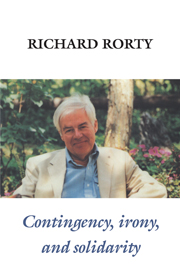Introduction
Published online by Cambridge University Press: 05 June 2012
Summary
The attempt to fuse the public and the private lies behind both Plato's attempt to answer the question “Why is it in one's interest to be just?” and Christianity's claim that perfect self-realization can be attained through service to others. Such metaphysical or theological attempts to unite a striving for perfection with a sense of community require us to acknowledge a common human nature. They ask us to believe that what is most important to each of us is what we have in common with others – that the springs of private fulfillment and of human solidarity are the same. Skeptics like Nietzsche have urged that metaphysics and theology are transparent attempts to make altruism look more reasonable than it is. Yet such skeptics typically have their own theories of human nature. They, too, claim that there is something common to all human beings – for example, the will to power, or libidinal impulses. Their point is that at the “deepest” level of the self there is no sense of human solidarity, that this sense is a “mere” artifact of human socialization. So such skeptics become antisocial. They turn their backs on the very idea of a community larger than a tiny circle of initiates.
Ever since Hegel, however, historicist thinkers have tried to get beyond this familiar standoff. They have denied that there is such a thing as “human nature” or the “deepest level of the self.”
- Type
- Chapter
- Information
- Contingency, Irony, and Solidarity , pp. xiii - xviPublisher: Cambridge University PressPrint publication year: 1989
- 4
- Cited by



